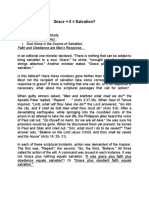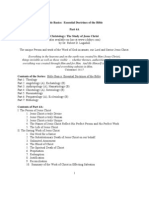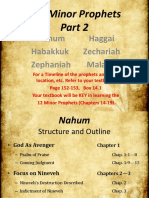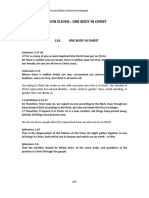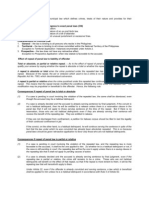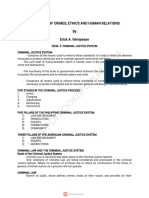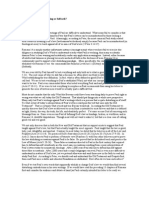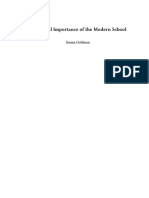The Book of James
The Book of James
Uploaded by
Emily ClarenceCopyright:
Available Formats
The Book of James
The Book of James
Uploaded by
Emily ClarenceOriginal Description:
Copyright
Available Formats
Share this document
Did you find this document useful?
Is this content inappropriate?
Copyright:
Available Formats
The Book of James
The Book of James
Uploaded by
Emily ClarenceCopyright:
Available Formats
The Book of James
Emily Clarence 8C #7
The Book of James is a book about the wisdom of Christ. The author of James is James
himself, which in this case, there are lots of James in the New Testament. However, the “James”
that is meant here is James the brother of Jesus. It is said to be him since the writing style and the
timeline matches, and more evidences were found to prove that it was that “James”. One of the
internal evidence was that He was the only one by that name with the authority to write the letter.
Second, his style of writing was like Jesus, as in the figure of speech. Third, the letter has strong
similarities to James’ speech in Acts 15, for example, the greeting in James 1:1 was similar to the
one in Acts 15:23, and is used nowhere else by the New Testament author. The external
evidences is that the early church accepted it as coming from James, including Clement of Rome,
Ignatius, and the Sheperd of Hermes. Also, the early Syrian Bible (the Peshitta) contained James,
and later Fathers accepted it.
The Book of James is written to the 12 tribes scattered abroad (the unbelieving Jews, all
Christians, and Jews of the Western dispersion) in Israel and around. The purpose of the letter
was to comfort the persecuted believers (1:5), James wished to commend ‘pure religion’ (v.27),
and he wanted to convict the mere “professors” of the faith who were not do-ers of faith
(2:14-26).
The book of James was written either around the 47-48 A.D. or 60-62 A.D. . The readers
were located in Israel and the surrounding areas.
The outline of James is as mentioned below:
I. Patience in Trials Rewarded
A. Purpose of Trials (vv.1-12)
B. Principles of temptations (vv.13-15)
II. Practice of Truth Required (1:16-27)
A. Truth is the instrument of life (vv.16-18)
B. Truth is the mirror of life (vv.19-27)
III. Partiality in Thoughts Rebuked (2:1-13)
A. Respect of others (vv.1-9)
B. Requirement of the law (vv.10-13)
IV. Productivity of Trust Revealed (2:14-26)
A. Profit of good works (vv.14-20)
B. Picture of good works (vv.21-26)
V. Perfection of Tongue Related (chap. 3)
A. Need of perfection (vv.1-6)
B. Lack of perfection (vv. 7-12)
C. Means of perfection (vv.13-18)
VI. Principles of Transgression Remedied (chap. 4)
A. The root of sin (vv.1-3)
B. The fruit of sin (vv.4-6)
C. The cure for sin (vv.7-17)
VII. Pervesion of Treasures Reviled (5:1-6)
VIII. Perseverance in Testing Recommended (5:7-20)
A. By patience (vv.7-11)
B. By propriety (v.12)
C. By prayer (vv.13-18)
D. By personal work (vv.19-20)
You might also like
- Notes On Philippians 1 - 27!2!11Document2 pagesNotes On Philippians 1 - 27!2!11ooibyannNo ratings yet
- Chapter 1-The Ethical Dimension of Human ExistenceDocument35 pagesChapter 1-The Ethical Dimension of Human ExistenceMa. Christina Bangngay88% (8)
- Jesus Is The WayDocument27 pagesJesus Is The WayKotch LupasiNo ratings yet
- 12 Characteristics of A Godly WomanDocument13 pages12 Characteristics of A Godly WomanEzekoko ChineseNo ratings yet
- 01 SalvationDocument3 pages01 SalvationElmer Perez Dela PeñaNo ratings yet
- Numbers 9 15-23Document3 pagesNumbers 9 15-23Rev. Christopher D. White100% (1)
- The Miracles of Jesus Christ - Finding The Tax Money in A FishDocument4 pagesThe Miracles of Jesus Christ - Finding The Tax Money in A FishCotedivoireFreedom100% (1)
- Blank Ncnda ImfpaDocument19 pagesBlank Ncnda ImfpaCollins LukmanNo ratings yet
- A&R Articles of Incorporation - Hunters Ridge Phase 5 & 6 - 20170825Document5 pagesA&R Articles of Incorporation - Hunters Ridge Phase 5 & 6 - 20170825James WallsNo ratings yet
- Into Thy Word Bible Study in 1Document6 pagesInto Thy Word Bible Study in 1richard5049No ratings yet
- Counting The Cost PDFDocument3 pagesCounting The Cost PDFJhon Ray OtañesNo ratings yet
- "Book of Titus" SummaryDocument2 pages"Book of Titus" SummaryRobertNo ratings yet
- James: The Author and The EpistleDocument5 pagesJames: The Author and The EpistleJames PeetNo ratings yet
- TMS Biblical BeliefsDocument6 pagesTMS Biblical BeliefsJohn C. Lewis100% (1)
- Grace + 0 Salvation?: Faith and Obedience Are Man's Response..Document4 pagesGrace + 0 Salvation?: Faith and Obedience Are Man's Response..Gerson Andres MuñozNo ratings yet
- Yeshua His Deity and SonshipDocument19 pagesYeshua His Deity and SonshipJun ValdezNo ratings yet
- Philemon Study GuideDocument8 pagesPhilemon Study GuideNirgl RaquelNo ratings yet
- 7 Churches in Rev - 4 - Thyatira 5-26-13Document12 pages7 Churches in Rev - 4 - Thyatira 5-26-13payasrommelNo ratings yet
- Colossians Study GuideDocument14 pagesColossians Study GuideRudika PuskasNo ratings yet
- Phil 02 - 25-30 The Mind of Christ (3) - in EpaphroditusDocument6 pagesPhil 02 - 25-30 The Mind of Christ (3) - in EpaphroditusÉverton GomesNo ratings yet
- 100 Bible Lessons: Lesson 34 - A False ProfessionDocument4 pages100 Bible Lessons: Lesson 34 - A False ProfessionJes ReelNo ratings yet
- WHAT DOES PROVERBS 8 - 22-31 TRULY MEAN - A Matter of TruthDocument28 pagesWHAT DOES PROVERBS 8 - 22-31 TRULY MEAN - A Matter of TruthJoshua Prakash100% (1)
- Hymnspiration WorkbookDocument40 pagesHymnspiration WorkbookJoshua DanielNo ratings yet
- Sermon Notes: "His Mercies Never Come To An End" (Lamentations 3)Document3 pagesSermon Notes: "His Mercies Never Come To An End" (Lamentations 3)NewCityChurchCalgary100% (1)
- Bible Study DetailedDocument8 pagesBible Study DetailedVasarhely IstvanNo ratings yet
- The Relation of Baptism To SalvationDocument31 pagesThe Relation of Baptism To Salvationaurelomnou2812100% (1)
- Studies in Malachi Carl HaakDocument42 pagesStudies in Malachi Carl HaakItak ChaNo ratings yet
- Acts 1711 Bible Study The Fear of GodDocument4 pagesActs 1711 Bible Study The Fear of GodJoseph BensonNo ratings yet
- Rel-Ed Reviewer (1ST Quarter) - 9Document17 pagesRel-Ed Reviewer (1ST Quarter) - 9Maryella FarinasNo ratings yet
- Flee From The Works of The FleshDocument3 pagesFlee From The Works of The FleshSonofManNo ratings yet
- Spiritual Warfare Movements: Origins in The Latter Rain TeachingDocument30 pagesSpiritual Warfare Movements: Origins in The Latter Rain Teachingrudy roberto waleanNo ratings yet
- Genesis 13 - The Separation Between Abraham and LotDocument14 pagesGenesis 13 - The Separation Between Abraham and LotJuan Carlos HerreraNo ratings yet
- John 20 Study GuideDocument11 pagesJohn 20 Study GuideCongregation Shema YisraelNo ratings yet
- The Names of JesusDocument2 pagesThe Names of JesusSundar PraveenNo ratings yet
- Colossians PDFDocument2 pagesColossians PDFRaymond0% (1)
- Michigan Bible School: January - April 2010Document25 pagesMichigan Bible School: January - April 2010Stanley JohnsonNo ratings yet
- Eleven Faithful ApostlesDocument3 pagesEleven Faithful ApostlesMICHELLE CASTRO100% (1)
- 5 Interesting Facts of The Book of JamesDocument3 pages5 Interesting Facts of The Book of JamesRobin .R.No ratings yet
- What Must I Do To Be Saved The Rich Young RulerDocument8 pagesWhat Must I Do To Be Saved The Rich Young RulerBOEN YATOR100% (1)
- Christology: The Study of Jesus Christ: Part 4A of Bible Basics: Essential Doctrines of The BibleDocument214 pagesChristology: The Study of Jesus Christ: Part 4A of Bible Basics: Essential Doctrines of The Biblerdlugi01No ratings yet
- Exegetical Notes - Amos 7-10-17Document6 pagesExegetical Notes - Amos 7-10-17Vasanth Yathavaraj & SandraNo ratings yet
- Discipleship: Can You Handle It?: It'S Not Just About The RitualsDocument5 pagesDiscipleship: Can You Handle It?: It'S Not Just About The RitualsZarah Jane LimNo ratings yet
- The Story of RuthDocument16 pagesThe Story of RuthLucille Barredo ClaveroNo ratings yet
- OT Books The 10 Commandments NT BooksDocument6 pagesOT Books The 10 Commandments NT BooksMistapankakeNo ratings yet
- The Truth About HellDocument9 pagesThe Truth About HelldexkieNo ratings yet
- 18 Fundamental Truths of UZICCDocument21 pages18 Fundamental Truths of UZICCConrado DirectoNo ratings yet
- Minor Prophets Nahum-MalachiDocument26 pagesMinor Prophets Nahum-Malachiroe100% (2)
- What It Means To GIVE To The Church, Part 3 - The Principles of New Testament GivingDocument14 pagesWhat It Means To GIVE To The Church, Part 3 - The Principles of New Testament GivingRob WilkersonNo ratings yet
- The Missionary and Conversion of PaulDocument10 pagesThe Missionary and Conversion of PaulErikaAlidioNo ratings yet
- Luke 19-28-40 Turning Rejection Into A Triumphal EntryDocument7 pagesLuke 19-28-40 Turning Rejection Into A Triumphal EntryDave McNeffNo ratings yet
- ResurrectionDocument4 pagesResurrectionMichael Jomar IsonNo ratings yet
- Theo 105 Hermeneutics Inductive Bible Study ModuleDocument54 pagesTheo 105 Hermeneutics Inductive Bible Study ModuleJan Ivan PabeloniaNo ratings yet
- Special Songs BookletDocument90 pagesSpecial Songs Bookletkabras CyberNo ratings yet
- Flesh of Man Vs The Spirit of ManDocument6 pagesFlesh of Man Vs The Spirit of Manapi-234347579No ratings yet
- New Member PacketDocument18 pagesNew Member Packetapi-449384239No ratings yet
- The Faith of Abraham P3-Greater Faith-Ps Ashish RaichurDocument6 pagesThe Faith of Abraham P3-Greater Faith-Ps Ashish RaichurapcwoNo ratings yet
- BK Acts 18 Chapter18 HandoutDocument19 pagesBK Acts 18 Chapter18 HandoutJeslyn NaomiNo ratings yet
- Expect Great Things-Ps Ashish RaichurDocument6 pagesExpect Great Things-Ps Ashish RaichurapcwoNo ratings yet
- Our Identity in Christ Part One Body Ps Ashish RaichurDocument6 pagesOur Identity in Christ Part One Body Ps Ashish RaichurapcwoNo ratings yet
- Bible StudyDocument106 pagesBible StudyJoJo Joestar Kujo100% (1)
- Bible Study - John 6 Part 1Document22 pagesBible Study - John 6 Part 1Clyde Leon BakerNo ratings yet
- TithingDocument8 pagesTithingjoelkowash8No ratings yet
- Engl1511 Annbib AnimalrightsarticleDocument6 pagesEngl1511 Annbib Animalrightsarticleapi-232646655No ratings yet
- Parent Manual 3-5 2016-2017FINALDocument51 pagesParent Manual 3-5 2016-2017FINALbinvinNo ratings yet
- Title 8 Course Outline SYLLABUSDocument5 pagesTitle 8 Course Outline SYLLABUSAngel AmarNo ratings yet
- Anholt-GfK Roper Nation Brands IndexDocument9 pagesAnholt-GfK Roper Nation Brands IndexJuan Haruo Inamine TNo ratings yet
- Criminal Law Justice Del Castillo DigestsDocument107 pagesCriminal Law Justice Del Castillo DigestsFatimah MandanganNo ratings yet
- Oil Pollution Compensation ActDocument14 pagesOil Pollution Compensation ActEdmart VicedoNo ratings yet
- Criminal Law PrelimsDocument31 pagesCriminal Law PrelimsWella JaneNo ratings yet
- Sinonimos en InglesDocument3 pagesSinonimos en InglesCristina Nog RuizNo ratings yet
- Conflict of Laws Adoption Carmil PlatilDocument15 pagesConflict of Laws Adoption Carmil PlatilJim Jorjohn SulapasNo ratings yet
- Predatory Female Shannon 20Document199 pagesPredatory Female Shannon 20OJ LoveNo ratings yet
- Ocampo Vs CADocument6 pagesOcampo Vs CARose Ann CalanglangNo ratings yet
- Speech AnalysisDocument1 pageSpeech AnalysisRanjika Basu MajumdarNo ratings yet
- (Crim Soc UCV) CRIMINAL JUSTICE SYSTEMDocument20 pages(Crim Soc UCV) CRIMINAL JUSTICE SYSTEMMichael SmithNo ratings yet
- Design of Disaster Crisis Center Function Based On Crisis Management ConceptDocument14 pagesDesign of Disaster Crisis Center Function Based On Crisis Management ConceptAang GunawanNo ratings yet
- Table of PenaltiesDocument64 pagesTable of PenaltiesDennis Cosmod100% (1)
- KYKO Dynamic PersonalityDocument9 pagesKYKO Dynamic PersonalityBernard Ah Thau TanNo ratings yet
- Case PresentationDocument21 pagesCase PresentationayhamsalimNo ratings yet
- Law On Sales, Agency, and Credit Transactions Atty. Jal A. Marquez Articles 1868-1932 Page 1 of 13Document13 pagesLaw On Sales, Agency, and Credit Transactions Atty. Jal A. Marquez Articles 1868-1932 Page 1 of 13Jal MarquezNo ratings yet
- Background To The Foundations of Business Ethics ADocument13 pagesBackground To The Foundations of Business Ethics AlucyNo ratings yet
- Chapter 1 Leg CounDocument2 pagesChapter 1 Leg CounBo DistNo ratings yet
- Benitez V SantosDocument13 pagesBenitez V SantosPrinceNo ratings yet
- HumankindDocument8 pagesHumankindIstiqla SalmaNo ratings yet
- 1 Hannover PrinciplesDocument4 pages1 Hannover PrinciplesArturo Aguirre SalasNo ratings yet
- Reviewer in FCR315 Lie Dtection TechniqueDocument11 pagesReviewer in FCR315 Lie Dtection TechniqueJenelyn JavierNo ratings yet
- Attitude Formation PDFDocument15 pagesAttitude Formation PDFSukumar Mani100% (1)
- FAQ - Romans 14:5 - Fasting or Sabbath?Document6 pagesFAQ - Romans 14:5 - Fasting or Sabbath?119 MinistriesNo ratings yet
- Emma Goldman The Social Importance of The Modern SchoolDocument8 pagesEmma Goldman The Social Importance of The Modern SchoolDani SilvaNo ratings yet














